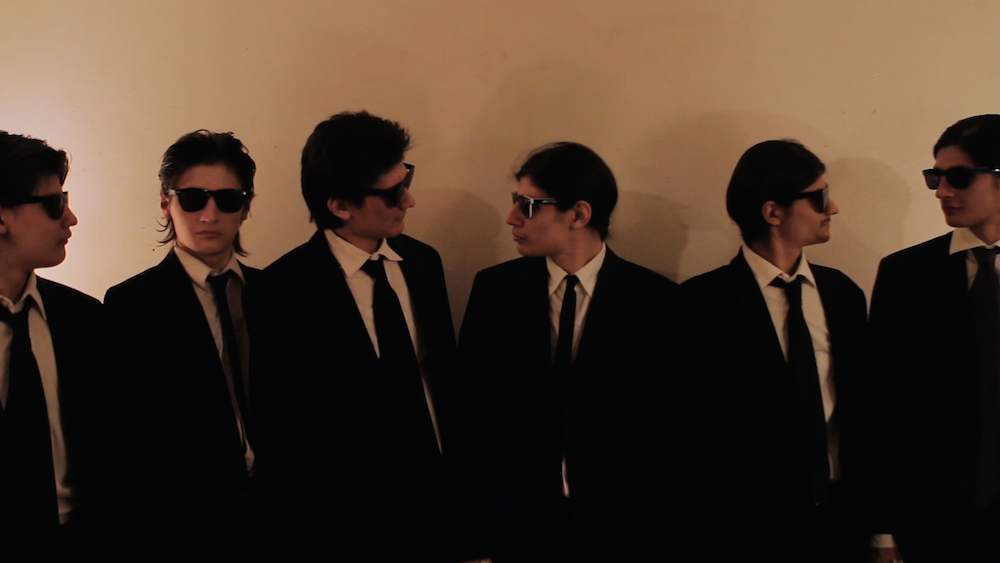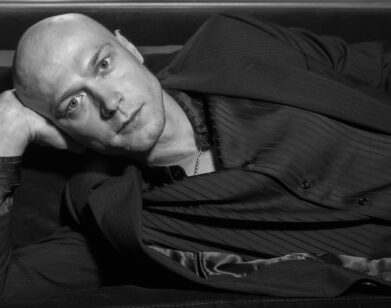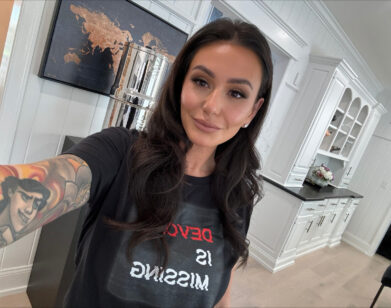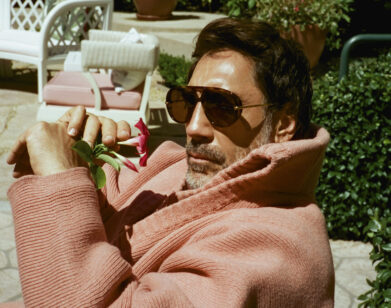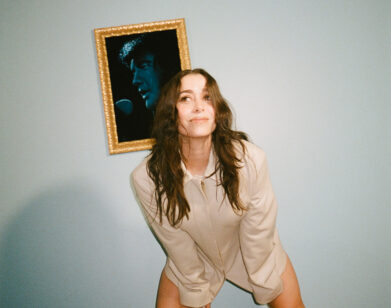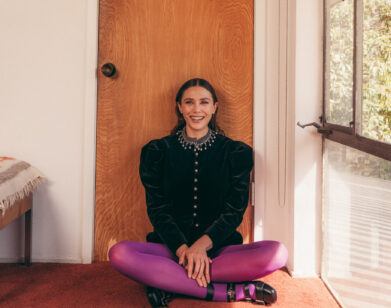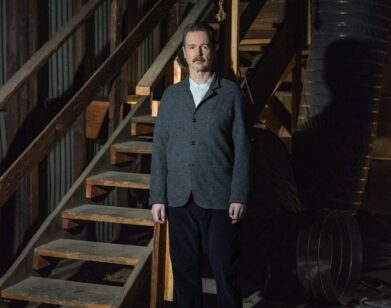In and Out of The Wolfpack’s World
Mukunda, Bhagavan, Govinda, Narayana, Jagadisa, and Krsna Angulo spent the majority of their young lives experiencing Manhattan from the window of their 16th floor apartment in a Lower East Side housing project, high above the eastern stretch of Delancey Street. Homeschooled and raised by their mother, Susanne, from the Midwest, and their father, a reclusive Peruvian Hare Krishna devotee wary of society, the six brothers (their names derived from Sanskrit), had minimal contact with the outside environment, locked in the apartment and warned against the dangers of what lay beyond.
But the Angulos found a way to escape. Despite their father’s decree of isolation, he gave the boys what would become their livelihood—movies, tons of them, in VHS and DVD form, and it became an obsession. Transcribing scripts, improvising wigs, and engineering props and costumes out of detritus like cardboard and yoga mats, the brothers recreated their favorite films ad hoc in lo-fi home movies, including Quentin Tarantino’s Pulp Fiction and Reservoir Dogs, and Christopher Nolan’s The Dark Knight. In 2010, when he was 15, Mukunda walked out, in secret, to explore the streets below, wearing a mask inspired by Halloween’s Michael Myers. His act of defiance quickly transformed life for the brood; the world was opening up.
Crystal Moselle, who co-produced and contributed cinematography for the documentary Excavating Taylor Mead, met the brothers by chance on a street corner in the East Village. She began filming immediately. The resulting film, The Wolfpack, Moselle’s first directorial feature, won the Sundance Jury Prize this year. Hauntingly intimate, the account constructs the Angulo brothers’ past and present lives, through childhood home movie clips and real time footage of their continual pursuit for personal autonomy. Trips to Coney Island and to an East Village movie theater for a showing of The Fighter feel revelatory; seeing Susanne reconnect with her mother in Michigan via a newly acquired cell phone is downright glorious.
At the moment, the Angulo brothers are growing up and getting out—Govinda moved into an apartment in Bed-Stuy; Mukunda started work as a production assistant.
We caught up with Moselle by phone earlier this week.
COLLEEN KELSEY: I’m so excited to talk about this film. But let’s start at the very beginning—what was your first encounter with the brothers?
CRYSTAL MOSELLE: I was walking down First Avenue and these kids ran past me with long hair. They were wearing all black; they may or may not have been dressed as Reservoir Dogs; they had sunglasses on. Their whole vibe really intrigued me. I instinctively just ran after them. By the crosswalk, I asked them if they were brothers and they were like, “Yes,” which is a crazy surprise because they all look identical. They asked me what I did; I told them I was a filmmaker. That’s really how it all started. We became friends and I would show them cameras in the park and we would all hang out. Eventually I uncovered this incredible story.
KELSEY: What year was that?
MOSELLE: About 2010.
KELSEY: How long did it take before you started filming them as an official documentary?
MOSELLE: It was a really organic process. I think at some point I was like, “Hey, I think this would be an interesting documentary!” But before that, I was filming them all the time and hanging out. We had this whole synergy going on.
KELSEY: This is your first directorial feature; when did you decide that documentary was going to be the genre?
MOSELLE: I think I’m just interested in telling good stories. Not just documentary, or narrative or whatever it is. I’m definitely driven by character and that’s a reason why I stuck with this film for so long. Their backstory wasn’t the reason why I made this film. It’s because they, as people, are so fascinating.
KELSEY: I feel like, for a group of kids that are so obsessed with the movies and spend a lot of time filming themselves, it must have been a very exciting prospect that someone would want to film them. But also, on the other hand, with the way they grew up, I can imagine that they’d be reticent about letting a stranger into their world. How long did it take for trust to build?
MOSELLE: It was actually right away. We had this common love for cinema, and that’s what the whole thing was really based off of. First of all, I didn’t know what their story was at that point. For me, I was just like, “Oh cool! I’m doing this film on these kids and it’s this character piece,” or whatever it is, I didn’t know what it was. That’s what the intention was. Slowly, they revealed to me their story. It really was in their hands.
KELSEY: When was the first time you started filming them in their apartment?
MOSELLE: I started filming in their apartment maybe five months into the process. I still had no idea what the story was. I was just like, “Oh, these kids are homeschooled, they had a different upbringing, my cousins were homeschooled…” I appreciated that they had a different upbringing and they were very creative. Then they would slowly reveal things to me like, “You’re our first friend to ever come over to our house.” Mukunda once revealed to me that he had to escape. That’s how things started. I’m a really optimistic, open person and I wasn’t really looking for parts of the story that were negative. I think maybe if somebody else came in that situation they would have probably had a bunch of red flags up. My brain wasn’t working in that direction.
KELSEY: Certain people might think that kids growing up in this world would maybe be a little brainwashed or insular in their living conditions. But something that was really surprising to me about each brother was how wide their worldview was, despite their isolation. That’s where exposure to movies comes in, but at the same time, movies are not real life. How did you see their personalities and engagement with the world transform as you were filming? There’s such growth from who these kids were, who they are, and who they’re going to become.
MOSELLE: The thing is they are so driven, and they knew exactly what they wanted to do and there was this plan they had. Obviously, that’s changed a lot since filming them. Mukunda and Govinda are both working in the film industry. Bhagavan is a dance instructor and is really into movement and acting. Narayana is more into activism, but everybody, all of them, still have this love for film and cinema and theater. They had this drive that was so fascinating to me because they all had it; they worked as a group. They’re starting their own production company, Wolfpack Pictures, and I helped them film this whole little short of reenactments, on commission basically. They’re working and doing their own thing and it’s becoming their own life, their reality. The first thing they said to me was, “We’re interested in getting into the business of filmmaking.” They were so driven to do that and it’s actually happening. They’re really sweet, fascinating kids and they look at life in a really fresh way. You don’t see that often in New York City.
THE WOLFPACK OPENS FRIDAY, JUNE 12.

